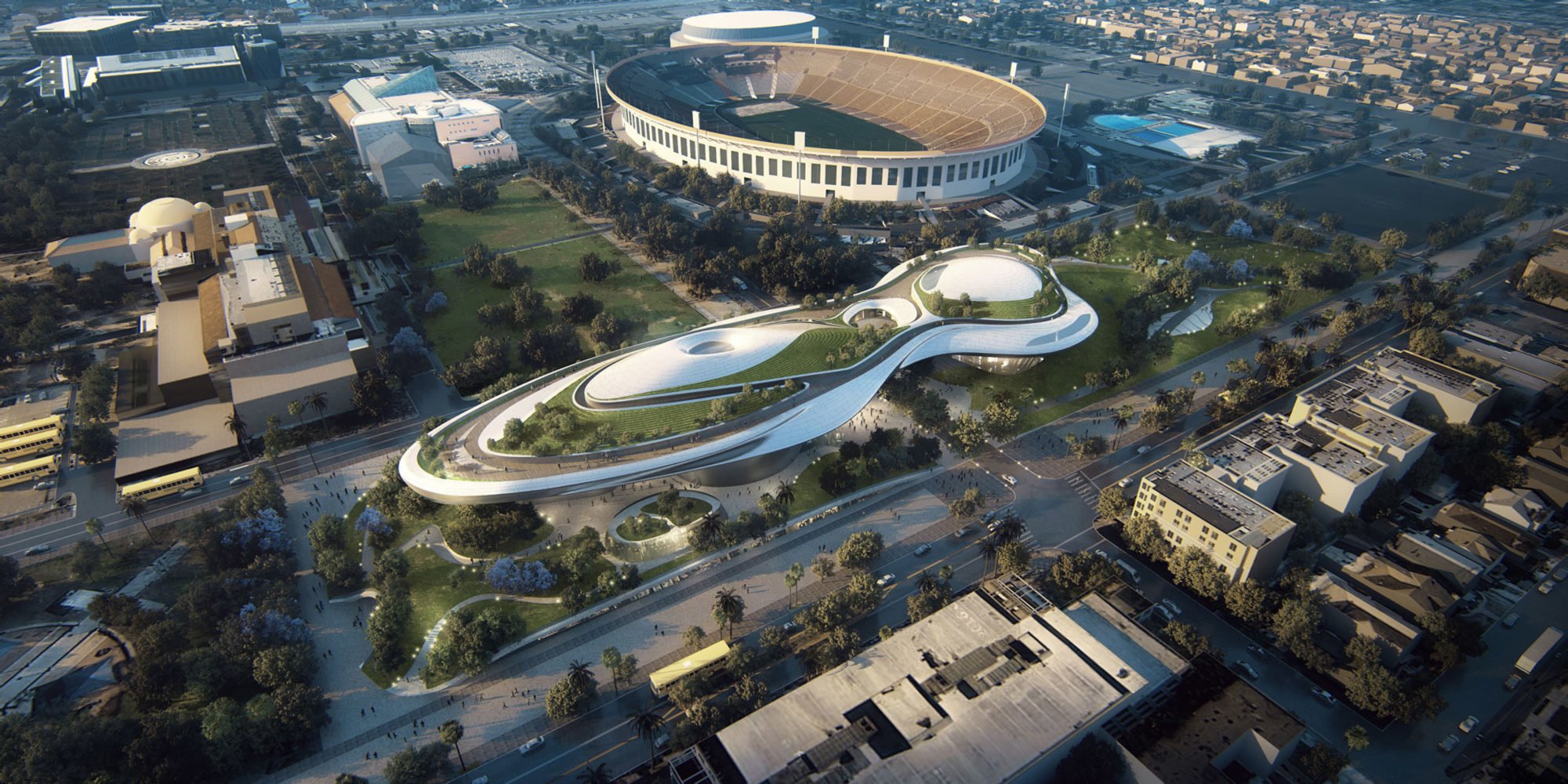
It’s only appropriate that Star Wars creator George Lucas’s efforts to found the Lucas Museum of Narrative Art have turned into an epic saga. Now, after months of deliberation, the filmmaker and art collector has selected Los Angeles over San Francisco and Chicago as the home of the new institution.
Los Angeles’s bid to host the museum was initially viewed as a long shot, as Lucas had already been considering San Francisco and Chicago for quite some time when the Southern California city threw its hat into the ring.
The decision was announced on January 11th in a letter from the museum board of directors that admitted that “settling on a location proved to be an extremely difficult decision precisely because of the desirability of both sites and cities.” Lucas will finance the $1 billion project, which will be located in the existing museum hub of Exposition Park, across the street from the University of Southern California, the filmmaker’s alma mater.
A rendering of the proposed Lucas Museum of Narrative Art design for Exposition Park in Los Angeles. Courtesy of the Lucas Museum of Narrative Art/MAD Architects.
“It feels like this incredible gift has come home. I always thought Los Angeles was the natural place to spread the vision of George Lucas and Mellody Hobson, to make art and creativity accessible and inspirational to the next generation,” Mayor Eric Garcetti told the Los Angeles Times about Lucas and his wife, calling it “a banner day for LA.”
The museum was originally planned for San Francisco’s Crissy Field. When that plan fell through, Chicago, Hobson’s native city, countered with a site on its lakefront museum campus. Los Angeles briefly made it a three-city fight, but Lucas chose the Windy City in June 2014.
For awhile, Chicago seemed like a done deal. Designs for the museum by Beijing-based architectural firm MAD Architects were unveiled, and the city council even voted to approve the project.
A rendering of the proposed Lucas Museum of Narrative Art design for Treasure Island in San Francisco Bay. Courtesy of the Lucas Museum of Narrative Art/MAD Architects.
Then the trouble began. There were protests from tailgating Chicago Bears fans who would have been displaced by the museum. A more serious challenge came in the form of a lawsuit from preservationist group Friends of the Parks, who claimed that the parking lot’s proposed transformation violated the state’s public trust laws.
As early as January 2015, there was speculation that the Chicago museum would never happen. It took another year and a half for that chatter to be proven right, but in June 2016 Lucas announced that it was back to the drawing board.
A rendering of the proposed Lucas Museum of Narrative Art design for Treasure Island in San Francisco Bay. Courtesy of the Lucas Museum of Narrative Art/MAD Architects.
At the time, it was expected that San Francisco would win out, with a proposed site on Treasure Island, a former Navy base. Instead, the Bay Area city has to once again deal with the disappointment on missing out on a major new cultural destination.
In October, Lucas shared MAD’s designs for both potential locations. Los Angeles ultimately prevailed, wrote the museum directors, because it “best positions the museum to have the greatest impact on the broader community, fulfilling our goal of inspiring, engaging, and educating a broad and diverse visitorship.”
“I am disappointed, of course, but must respect the decision,” said San Francisco Mayor Ed Lee in a statement, according to the San Francisco Chronicle. “I am proud that our city came together like never before to deliver a bold vision and thoroughly viable plan for the museum.”
Artwork by Helen Mary Jacobs and Arthur Rackham. Courtesy of the Lucas Museum of Narrative Art.
The project is expected to bring tens of thousands of construction jobs to the city, plus at least 1,000 permanent jobs connected to museum operations. The museum will house Lucas’s collection of Hollywood memorabilia, as well as some 10,000 paintings and illustrations by the likes of Maxfield Parrish, Alberto Vargas, Norman Rockwell, R. Crumb, and N.C. Wyeth.
The museum, which is billed as a celebration of storytelling, hopes to open its doors in 2020.